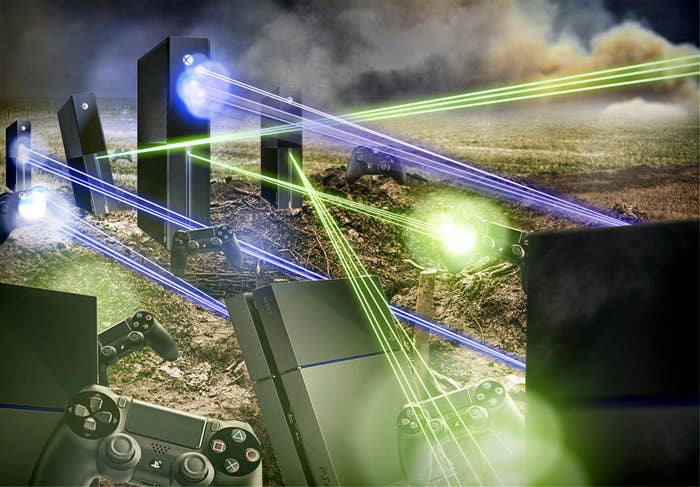
With the release of the PlayStation 4, next Friday marks the beginning of hostilities in the return of that ancient conflict, the Console Wars.
Like all the worst wars, Console Wars are long, brutal, and senseless, and yet we humans, partisan beasts by nature, cannot seem to avoid them.
This one, in which a resurgent and wrathful Sony will match its gleaming new black machine against its old foe, Microsoft and its...gleaming new black machine, promises to be the most destructive yet.
We have stared into the flames, and seen one version of the future, which runs red with blood Flamin' Hot Cheetos.
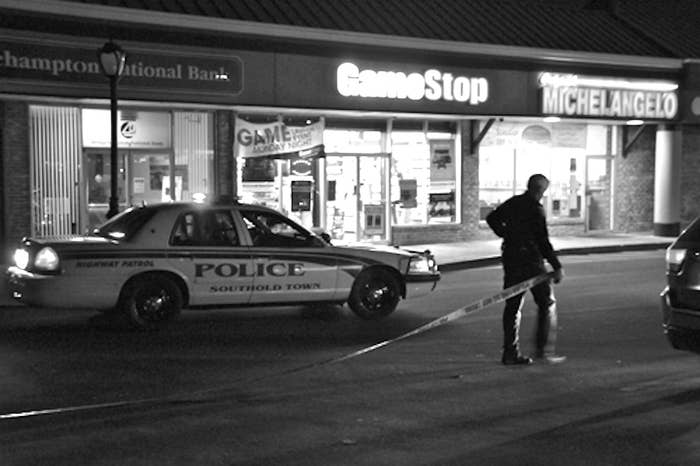
Nov. 15, 2013, or C-Day: Sony launches its new video game console, the PlayStation 4. Buoyed by a historic swell of enthusiasm from gamers, the PS4 sells out at stores across America. Desperate gamers bivouac next to barren Walmart shelves, where they ration Gushers and share tales of glorious launch days past. The lucky pre-orderers, in basements and studio apartments the world over, chuckle smugly at news reports of the huddled masses, but fight back strange feelings of emptiness when they realize that they have nothing to play, really.
Nov. 22, 2013, or C-Day, Part Two: Microsoft launches its new video game console, the Xbox One. Launch day is marred when lined-up customers in major cities across the U.S. and the U.K. are glitter-bombed by masked gangs, robotically chanting "Play-stay-shun." For years afterward, these operations will be referred to, in hushed terms, as "The Siege of Mallingrad."
Those lucky enough to escape discover that the One's voice capabilities ("Xbox: On"; "Xbox: Watch Television") immediately suggest a new form of humor: "Xboxing." Examples include "Xbox: Go Fuck Yourself," "Husband: Wash Dishes," and "Dog: Eat My Homework."

Dec. 28, 2013, or The Great Dongtroversy: Elizabeth Shecter, a 53-year-old Ohio mother of two, notices while dancing with her fully clothed family in front of their new Xbox One that she can see quite clearly her husband's, her son's, and her daughter's boyfriend's penises on their 60-inch flat-screen television. Scandalized, she calls the local news, which coins the phrase "The Great Dongtroversy" in a segment that goes viral.
"Xbone", an early nickname for the console, takes on new meaning.
Microsoft apologizes and releases a mandatory "no-dong" patch, which uses smart technology to identify all dongs and turn them into cartoon ice cream cones.
Feb. 14, 2013, or the Valenteen's Day Assacre: Alarmed parents realize that their teenage children are using the PlayStation 4's dedicated "Share" button, in concert with the PlayStation Eye camera, to send each other explicit videos in honor of Valentine's Day. Some are mere nude twerking; others are far more graphic. Microsoft uses this opportunity to promote its family-friendly, pan-living room feature set: Xbox One, now dong-free, is the game system that families can enjoy together (read: spy on each other). In combination with the early March release of the Xbox One-exclusive megahit Titanfall, Sony's early momentum in the war erodes.
Oct. 2, 2014, or the Low Din of Mild Inconvenience: Approximately 10 months after the release of the Xbox One, a not-insignificant percentage of owners report a barely audible hum from their machines. It is first compared to the sound of a laptop, then a dishwasher, then a Pantera concert. Users begin complaining of headaches and fatigue, and blame it on the noisy console.
It immediately becomes one of the major civil rights issues of our time. Reddit crashes under the traffic strain. Change.org becomes the most trafficked site on the internet. ThinkGeek begins selling PlayStation 4s under the mock title "Xbox One Silencer". Sony releases propaganda posters about human rights conditions on "the other side."
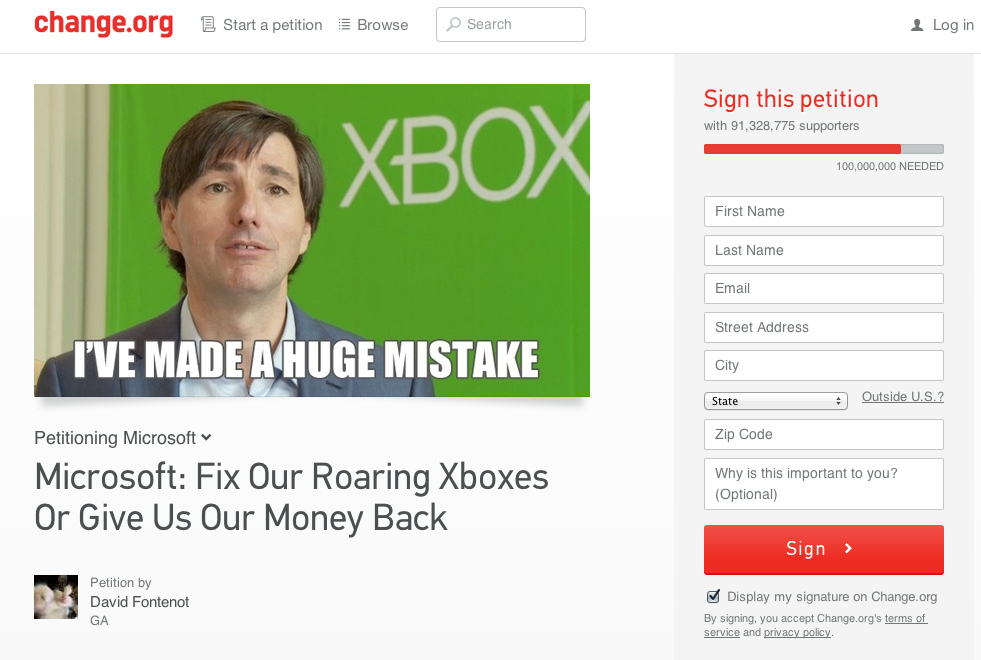
Nov. 21, 2014, or the PSeNsive: With a single word, "LoL," Gears of War creator Cliffy B changes console history. That acronym, written in a tweet with a picture attached of an error message ("PlayStation Network is currently down"), gives voice to millions of gamers outraged by short and infrequent service interruptions. Retweeted over 500,000 times, "LoL" becomes a rallying cry for Xbox One partisans in ubiquitous schoolyard skirmishes.
January 2014–December 2014, or The Faceworn Folly: In-house, top-secret R+D labs at both Microsoft and Sony work grueling and frantic hours in a bid to create virtual-reality peripherals for the 2016 Christmas season. Rumors spread: Sony is draining money from its profitable Japanese life insurance concern to fuel its VR program; Microsoft's headset is so convincing, several testers experience complete psychological dissolution; Sony's facility is underwater.
An internal Nintendo intelligence report bearing the title Virtual Reality: Those Who Don't Learn From the Past Are Doomed to Repeat It surfaces on VGLeaks.com. Microsoft, Sony, and an imminent-to-market Oculus prepare litigation.
Then the Rift, like the Virtual Boy before it, proves a total consumer dud. Microsoft and Sony both kill their secret programs and try, with limited success, to conceal the evidence, as well as their lawsuits. Thereafter, old men refer to head-worn VR as "The Graveyard of Empires."
November 2015–March 2016, or the Long Winter: A lackluster holiday season featuring almost no exclusive titles for either console sends millions of gamers in each camp into an existential malaise. What is the point of fighting for our console? they ask themselves. What is the point of gaming at all? Sony and Microsoft retrench, and each independently decide to rerelease its consoles in bright, limited-edition colors. Morale immediately lifts.
Oct. 13, 2016, or The Battle of the Somme Really Big Games Finally: Three years after the start of hostilities, fans fight the most infamous and ferocious battle of the Console War. On the same day, Naughty Dog releases This Time It's Really the Last of US on PS4, and Epic releases Gears of War 5: A Lion in Winter for Xbox One. Mobs burn effigies of Marcus Fenix and that dude from The Last of Us in fetid basements. Brothers fight brothers. Parents find the limits of the timeout stretched to the breaking.
April 2017, or the Kyoto Double Cross: A Nintendo triumvirate comprising Sartoru Iwata, Shigeru Miyamoto, and Reggie Fils-Aime receive at their high command in the ancient city of Kyoto leaders from Microsoft and Sony. For years, Nintendo has claimed a Swiss neutrality in the Console War, and yet its role has in reality been closer to France in the American Revolution: It has encouraged laid off employees, following weak sales of the Wii U, to move to Remond to work on Kinectimals.
The pretext for the meeting: peace negotiations. And yet, in a brilliant and spiteful tactical maneuver, Nintendo has only invited the leaders to its headquarters so that it can announce it has signed a deal with Apple to license Mario, Zelda, and Metroid games to iOS. Miyamoto-san's impish grin reads as pure evil.
Chaos reigns.
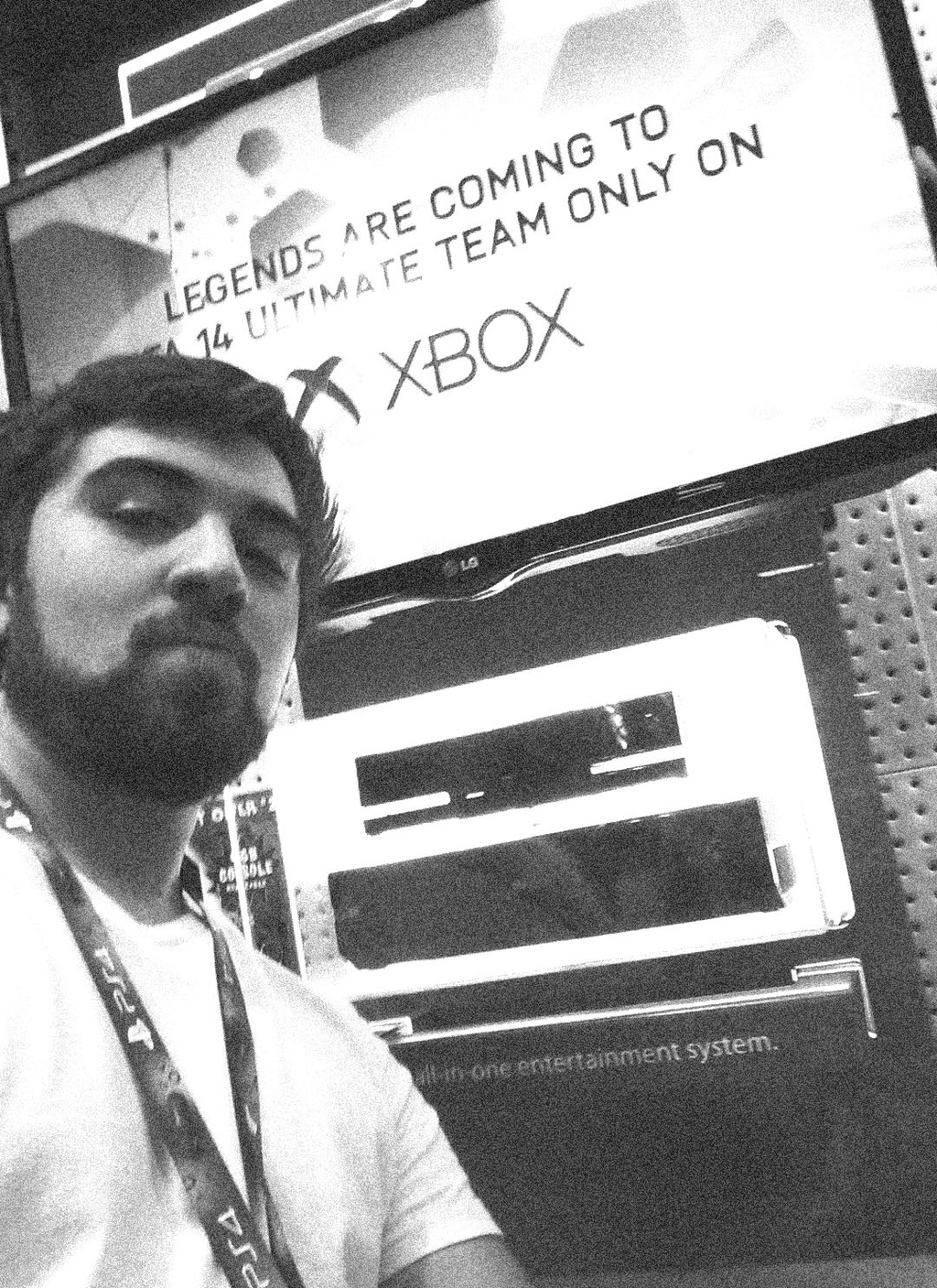
October 2019–December 2019, or The Draft: Three years into the first Cruz administration, six years after C-Day, the Console War reaches its peak, by sales (just like the previous one). Casual and occasional gamers are finally able to justify the purchase of the "next" generation, as prices have come down to $199 for a new PS4 or Xbox One. While, as a consequence, more and more "soldiers" are being conscripted into each "army," the new, less-invested console owners have the effect of diluting the hatred on each side. Fewer soldiers know why they began fighting in the first place. Many were lost to college, others to the twin discoveries of sex and marijuana
Burnt out gamers from both sides put down their controllers and come together to form a social movement, called Gamers Care. While GC starts out as a peace movement, its members, outside the culture of gaming for the first time in their lives, come to realize that games are actually problematic in ways outside of the console war. The men of Gamers Care, in a landmark series of Reddit posts, break the news to the world that games are corrosively violent, sexist, and insultingly repetitive from year to year.
Gamers Care go on to discover the pleasures of older art forms, such as reading, and inaugurate weekly "Book Clans" in which members take turn suggesting a book for group discussion "raids".
The most radical Gamers Care members splinter into a new type of full-body gaming, called sports.
Jan. 1, 2020, or The #YOLO Conference: Microsoft and Sony executives meet and agree to end hostilities, in a peace deal brokered by Tim Cook and Gabe Newell. It's a lasting peace, but even at #YOLO, the seeds of a new and more durable hatred are sewn.
Aware of a looming threat in the form of Steam's increasingly polished living room consoles, and Apple's increasingly powerful cable boxes with App Store access, Microsoft and Sony sign a secret non-aggression and profit-sharing deal, agreeing that their mutual survival in the face of these new ideologies is more important than their history of conflict.
All parties to the #YOLO Conference agree that such wanton destruction and disregard for human dignity can never happen again. In honor of those lost to the Console War, the great powers erect a single monument, devastating in its simplicity:
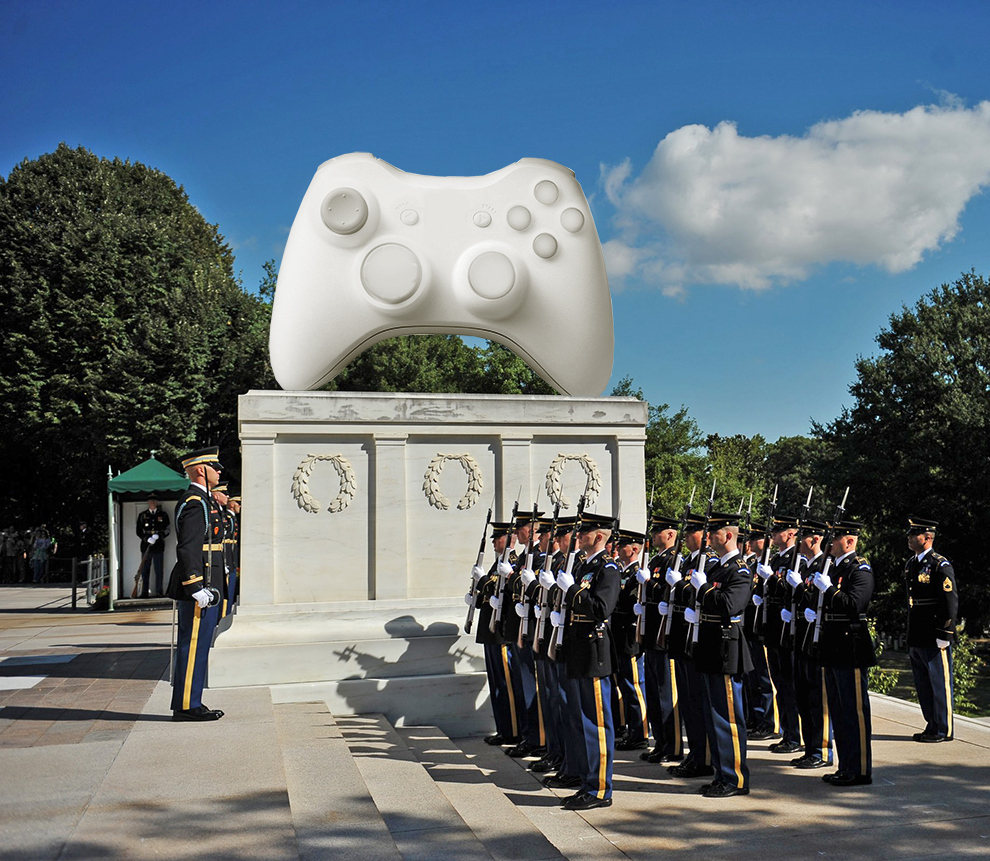
And yet, days later, the Console Cold War begins.
